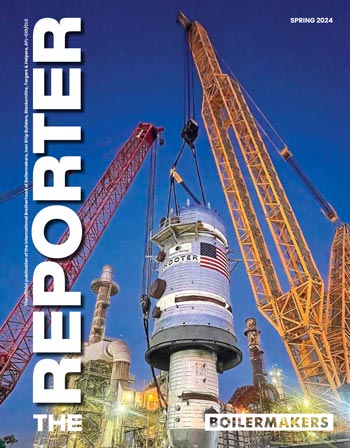NOT ONLY MUST applicants to the Boilermakers’ scholarship program meet all the eligibility requirements, they also have to complete a 300-500 word essay on an assigned topic.
While space does not permit publication of these essays in their entirety — or even excerpts from each of the 140 essays that were submitted — the Boilermaker Reporter would like to share the following views from some of our top 2009 scholarship recipients on this year’s topic: “Name the biggest challenge facing unions in the next 10 years.”
Heather Hamilton, our top scholarship award winner, feels the union’s biggest challenge this coming decade will be getting workers to stand united: “The attacks on September 11 showed us our weaknesses in our defenses. We heeded that warning and quickly repaired and strengthened our borders. Now we need to realize that we face another threat just as ominous in its aims as the terrorists of September 11. Only now that target is the American worker and the union which stands beside him.”
Kieran Carlisle, one of our $3,500 award recipients, believes globalization of America’s products is the biggest challenge facing unions, but if met head on, could become the unions’ biggest opportunity. He wrote: “For the United States economy to rebound from a deep recession, it is essential to return manufacturing base jobs to America. With the new stimulus plan, unions under the Barack Obama administration have the chance to prove that union workers can produce superior products under safe working conditions. Once again, global industries will set American unions’ hard work and perseverance as the precedent for all others to follow.”
Whitney Rice, our other $3,500 award recipient, feels the biggest challenge facing unions will be addressing an “informational society” where many people are self-employed and self-reliant entrepreneurs. “The workplace is changing. There has been a massive shift in our economy from the manufacturing sectors to the service sectors. . . labor unions must develop the appropriate structures and policies to represent workers’ interests under modern conditions.”
Ryan Yeh, one of seven $2,000 scholarship recipients, states the greatest challenge this next decade is the lack of functional unions in developing nations. “American and Canadian businesses cannot compete with cheap labor. If the elimination of unions is the only way for businesses to remain viable and competitive, unions may leave the societal picture before we know it. Developing nations must see that unions are in their best interests . . . the problem facing those nations is not a lack of wealth, but an unequal distribution of wealth. By placing political and social pressure on governments to embrace unionism . . . we can hope to have a more just distribution of wealth.”






